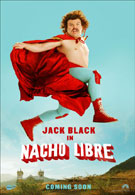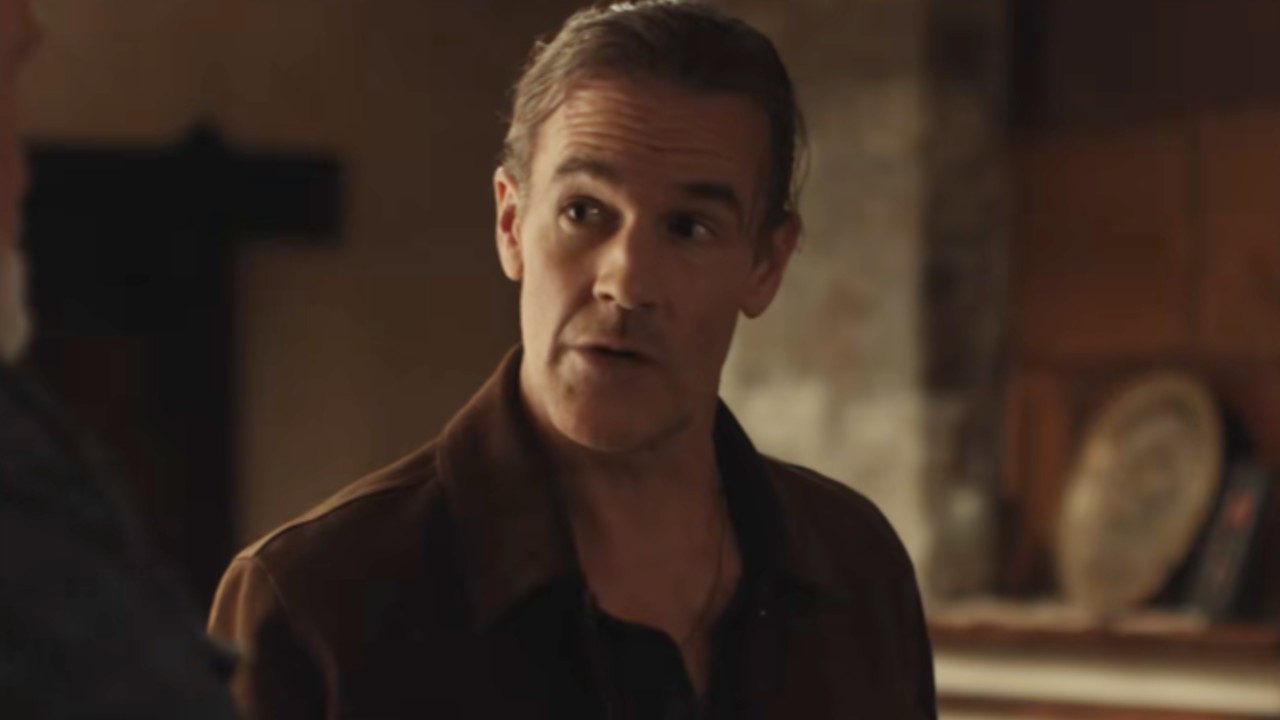After toning it down and reigning himself in for King Kong, it was time for Jack Black to really let go again. Nacho Libre is the perfect venue for it, a film constructed around Jack’s ability to simply go crazy on screen, punctuated by the uncomfortable pauses and oddly placed silences familiar to anyone who saw director Jared Hess’s last film Napoleon Dynamite. But unlike Napoleon, Nacho has a legitimately talented comedic actor and a sympathetic character you can actually root for, instead of feeling slightly guilty for laughing at him.
It starts with an orphan named Ignacio (Jack Black). Though raised in a poverty-stricken Mexican monastery, Ignacio has always been more interested in Luchadors than Jesus. Luchadors are the flamboyant Mexican version of wrestlers. They compete in an over-the-top sport called Lucha Libre, and south of the border they’re heroes. Ignacio grows up, and since he’s raised by monks he has little choice but to become a monk himself. But the brothers know he doesn’t know that much about the holy stuff, and relegate him to being the monastery’s cook and go-to guy for giving last rites. Ignacio loves the orphans he cares for at his monastery, but hates life as a servant of the Lord. Though it’s a sin, he still dreams of becoming a Luchador, and fantasizes about a life filled with expensive clothes and fresh ingredients for his beloved orphan’s food.
One day, Ignacio gets fed up and steps into the ring. He recruits a dirty street thief named Esquelto (Héctor Jiménez) as his tag team partner, and together they join the ranks of their small town’s amateur wrestlers. Luckily for them, you don’t have to win to get paid. By night Ignacio is the spectacularly unsuccessful masked wrestler Nacho, by day he’s a not-as-humble-as-he-ought-to-be priest with an unfulfillable crush on his monastery’s new, hot nun (Ana de la Reguera). Numb to the possibility of eternal damnation, Nacho tries to make a move, but the best he can muster is an awkward offer of late-night toast. At least it’s good toast.
The real thrust of the story is Ignacio’s struggle within himself to be something more than a monk scrounging for slop to feed his orphans in the back alleys of Mexico. He’s not satisfied with just that God stuff, and the strength of the script is in watching him figure out what’s really important. Not that it’s all that serious. Nacho Libre is a crooked smile from beginning to finish. The best laughs smack you upside the head when you least expect it. Hess has a real talent for leading his audience in one direction, while he prepares a joke to blindside you from the other. Nacho Libre is understated when you’d expect it to be outlandish, and outlandish when you’d most expect it to be understated.
Ok, maybe Nacho Libre’s not exactly treading new ground; this is after all, basically a wrestling comedy. The story follows a pretty simple underdog theme, it’s only the details around that basic rooting for the little guy path that make it different. For instance this wouldn’t have worked nearly as well in an American setting with the WWE as a backdrop. Mexico itself is a grimy, hot, poverty stricken character in the film and the desperate need for some sort of hope among the people is almost palpable. Almost as if to compensate for Jack’s Caucasian-ness, the film is not only shot in Mexico, most of the cast and crew Mexican too.
What it comes down to is that Nacho Libre is every bit as funny as the trailers might lead you to believe. If you didn’t laugh at the advertisements, well then this type of humor just isn’t for you. Skip it. Some types of comedy aren’t for everyone and Nacho Libre is probably going to be a love it or hate it affair. Believe it or not, some people still don’t get Monty Python. For those whose sensibilities do match up with this; fat, mustachioed Nacho may not be much of a hero but mixing the wild style of Jack Black with the comedic hesitancy of Hess results in a picture all at once funny, sweet, and surprising. It’ll live up (or down) to whatever you expect.
Your Daily Blend of Entertainment News


